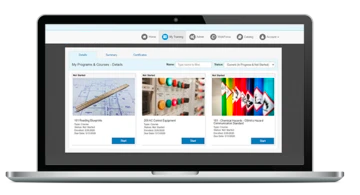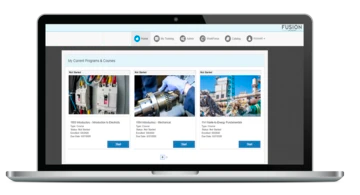Covers the purposes and kinds of controllers and their relationship to other components in process control systems. Explains the concepts of current-, position-, and time-proportioning control. Compares the operation of several kinds of controllers. Describes the operation of proportional, integral, and derivative modes, and discusses tuning procedures for each. Discusses cascade, feedforward, ratio, and auctioneering control systems as well as other operations. Describes ways to eliminate or reduce controller problems. This course has no prerequisites. Working with Controllers is available in online technical training and course manual formats.
Lesson 1 - Introduction to Controls
Topics:
Process dynamics; Current, position, and time proportioning; Controller modes, actions, terminology, and options; Loop accuracy
Learning Objectives:
– Describe the kinds of controllers most often used in industrial applications.
– Discuss six important problems of process dynamics that controllers must overcome.
– Compare the actions of current proportioning, position proportioning, and time proportioning.
– Name four kinds of controller alarms.
– Discuss the importance of safety in control loops.
Lesson 2 - Controller Operations
Topics:
Automatic/manual control; Range and span; Direct-, reverse-acting, on/off, and proportional controllers; Current, time, and position-proportioning control; Control strategies
Learning Objectives:
– Explain why automatic/manual control is necessary.
– Explain how on/off controllers work and discuss the difference between on/off and proportional controllers.
– Describe a basic controller tuning process.
– Describe current-, time-, and position-proportioning controllers and name possible uses for each.
– Explain how split control works.
Lesson 3 - Controller Modes and Tuning
Topics:
Proportional mode; Offset; Integral mode (reset); Derivative mode (rate); Single, two, and three mode controllers; Loop tuning; Step-change response
Learning Objectives:
– Describe the effect of the proportional, integral, and derivative modes on a controller's response to process changes.
– Discuss proper uses for the proportional, integral, and derivative modes.
– Explain how the proportional, integral, and derivative modes affect the tuning of a controller.
– Describe the procedure for tuning a controller by the step-change response method.
Lesson 4 - Special Controller Applications and Options
Topics:
Cascade, feedforward, ratio, and auctioneering control; Hardware options; Remote setpoint; Auxiliary outputs; Indicators; Limits and alarms
Learning Objectives:
– Compare cascade, feedforward, ratio, and auctioneering control strategies.
– Describe three optional features used with auto/manual controllers.
↺ Back to Process Control Systems Online Training Courses Courses





